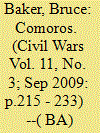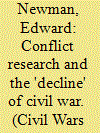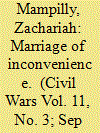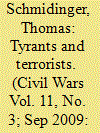|
|
|
Sort Order |
|
|
|
Items / Page
|
|
|
|
|
|
|
| Srl | Item |
| 1 |
ID:
103117


|
|
|
|
|
| Publication |
2009.
|
| Summary/Abstract |
The Comoros archipelago has had a troubled political history with territorial division at independence and, for the state of Comoros, repeated coups and a recent attempted secession. The article analyses the structural and contingent factors behind the susceptibility to conflict. It finds that the political and economic weaknesses that provoke conflict remain unaddressed and that these have been exacerbated by a failure of governance by government and civil society. Consequently, Comoros has failed to achieve viability and with it stability. The conclusion asks whether state viability in the western sense can be achieved or whether a hybrid form of governance should be supported. Currently the unresolved post-conflict issues look likely to spark further political crises and possibly violence.
|
|
|
|
|
|
|
|
|
|
|
|
|
|
|
|
| 2 |
ID:
103119


|
|
|
|
|
| Publication |
2009.
|
| Summary/Abstract |
In recent years a number of scholars have suggested that there has been a decline in the absolute numbers of civil wars since the early 1990s, and this claim is purportedly supported by empirical evidence. This paper explores the methodological challenges which confront the study of conflict trends and identifies a number of problems with prevailing approaches. It argues that a differentiated approach to the concept of civil war is necessary before it is possible to make claims about trends in numbers of conflicts, because even the most sophisticated methodological processes have problems related to the manner in which they define and codify armed conflict. Nevertheless, the paper accepts that there has been a decline in the number of major civil wars, and it proposes - and evaluates - a number of explanations for the decline in such wars. These are: the decline of potent ideology since the end of the Cold War, which had hitherto ignited and/or exacerbated armed violence; the decline in intervention by third parties in civil war, a key feature of 'proxy' conflicts during the Cold War; the increasing tendency for secession - or hard partition - to be recognised by the international community, which has defused some ongoing conflicts; the increasingly interventionist nature of peacekeeping and peacebuilding activities by international organisations; the growing tendency for powerful states to view civil war and state failure as a potential security threat, resulting in a more substantial effort to resolve conflict which might have hitherto been regarded as 'merely' a humanitarian issue or even completely ignored; and the growing number of consolidated democracies.
|
|
|
|
|
|
|
|
|
|
|
|
|
|
|
|
| 3 |
ID:
103121


|
|
|
|
|
| Publication |
2009.
|
| Summary/Abstract |
Scholars have shown how transnational forces can influence the behavior of belligerents in a civil war, dramatically altering the trajectory of the conflict. The breakdown of the peace process in Sri Lanka, less than a year after the Asian tsunami, has led many to question the relationship between the disaster and the return to war. In this paper, I explore the complex relationship between Liberation Tigers of Tamil Eelam (LTTE) governance structures and the international community, arguing that post-tsunami relief efforts closed the door to a negotiated settlement by contributing to the insurgency's failed play for autonomy from the Sri Lankan state upon which it had long been reliant for assistance in governing the civilian population in the northern and eastern provinces of Sri Lanka. Through a detailed case study of the micro-level impacts of a massive spike in foreign aid on the organization of a long-running insurgency, the paper is able to assess the merit of the 'substitution effect' posited by scholars that argues that foreign aid can allow rebels to ignore civilian concerns in favor of a purely military focus. While generally supportive of this argument, the paper complicates the picture, demonstrating the importance of understanding local contexts for the international relief apparatus that continues to serve as the primary response to disasters, both natural and man-made.
|
|
|
|
|
|
|
|
|
|
|
|
|
|
|
|
| 4 |
ID:
103118


|
|
|
|
|
| Publication |
2009.
|
| Summary/Abstract |
When does bargaining between government and opposition groups turn violent? In this article, I argue that groups with cohesive, developed organizational structures are less likely to engage in conflictual behavior. Opposition movements are often divided into moderate and radical challengers, and groups without developed organizational structures cannot limit radicals' demands. The argument is supported in a comparative analysis of bargaining processes in Algeria and Chile in the late 1980s. In Algeria, the primary opposition group was marred by internal divisions and tensions between radical and moderate elements. When the party emerged victorious in democratic elections, the government feared that radical elements would soon take over, canceled election results and attempted to reestablish control by using force. Opposition parties in Chile, however, presented a cohesive and unified alternative to the Pinochet regime, which contributed to a peaceful transfer of power.
|
|
|
|
|
|
|
|
|
|
|
|
|
|
|
|
| 5 |
ID:
103120


|
|
|
|
|
| Publication |
2009.
|
| Summary/Abstract |
This article seeks to engage scholars in a richer understanding of post-civil war settlement implementation. It examines why some parties execute the provisions of these agreements fairly extensively, whereas others abide by few, if any, dimensions. We explore four peace settlements, developing a new measure that gauges various aspects of implementation. We examine how two factors in particular affect the degree to which parties abide by their commitments. First, we find that implementation is more likely as international support increases. This occurs through three chief mechanisms: mitigating commitment problems, generating audience costs, and the contingency of aid on implementation. Second, the balance of capabilities is a significant domestic influence on implementation. Parties are most prone to abide when the government is militarily superior, but the former rebels are powerful enough to meaningfully check government action. Implementation is less successful when government capabilities far exceed those of the rebels or when the rebels are particularly strong.
|
|
|
|
|
|
|
|
|
|
|
|
|
|
|
|
| 6 |
ID:
103123


|
|
|
|
|
| Publication |
2009.
|
| Summary/Abstract |
Failed states that foster warlords and terrorists are now an increasing challenge to state stability across the Middle East. This paper uses the case studies of Iraq and Sudan to show how a neo-liberal policy of dismantling the public sector by an illegitimate regime that combines tribalisation with the arbitrary use of power leads to dramatic weakening of the state and an increase in warlordism.
|
|
|
|
|
|
|
|
|
|
|
|
|
|
|
|
| 7 |
ID:
103122


|
|
|
|
|
| Publication |
2009.
|
| Summary/Abstract |
Unlike its presence in the world of politics, religion failed to take a prominent role in political science in much of the modern era. Recent research suggests this might be changing. It also suggests that in order to study religion, scholars need more data on the subject. This study introduces a new data collection on religious discrimination at the minority level and uses this new data collection to compare religious discrimination in western democracies, Asia and the Middle East for the time period 1990-2004. In this paper, religious discrimination, ethnicity and religion are first discussed with specific emphasis on Muslim majority states and the Middle East. Second, the process of data collection, including case selection, forming a religious discrimination index, coding and back-up coding issues, is outlined. Finally, results on religious discrimination in different regions and states with different majority religions are presented. The data indicate that western democracies treat their religious minorities much better than Middle Eastern countries or Asian countries. Yet the Middle East, which is considered the most prominent example of a region with religious tension, does not have significantly higher average religious discrimination values than Asia. Similarly, even though states with a Muslim majority seem to be less tolerant compared to states with a Christian majority, in states with other majority religions such as Buddhism or Hinduism, discrimination against ethnoreligious groups is present as well. Moreover, religious discrimination values for the minorities in western democracies increased after September 11.
|
|
|
|
|
|
|
|
|
|
|
|
|
|
|
|
|
|
|
|
|